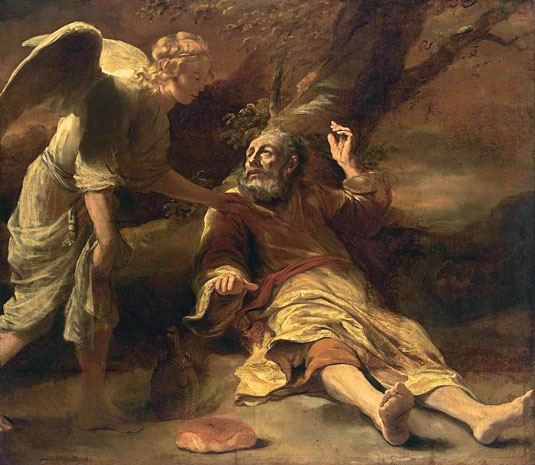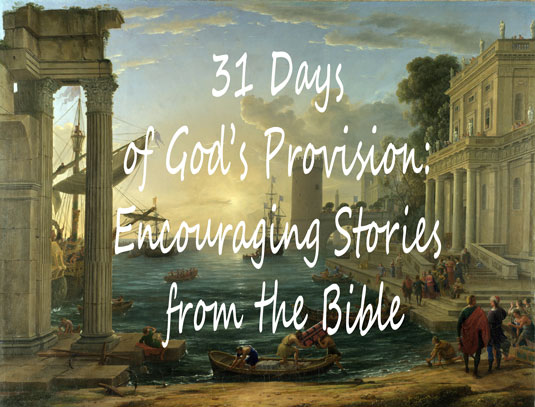 The prophet Elijah lives during a time of rising prominence for the prophet and diminishing significance for the priest. His story takes place long after the reigns of David and Solomon. Following the death of King Solomon, his son assumes leadership, but a challenge to that rule fractures the kingdom leaving it divided. The usurper Jeroboam takes over the northern part of the kingdom, referred to as Israel, while Solomon’s son Rehoboam retains rule over the southern part called Judah. Six kings later, Ahab is the latest installment of evil leaders in the northern kingdom of Israel. And to make matters worse, the king is married to an evil shrew. His lovely bridezilla is called Jezebel, and her father is a high priest of Baal. Together Mr. and Mrs. Ahab plunge Israel into idolatry with a passion.
The prophet Elijah lives during a time of rising prominence for the prophet and diminishing significance for the priest. His story takes place long after the reigns of David and Solomon. Following the death of King Solomon, his son assumes leadership, but a challenge to that rule fractures the kingdom leaving it divided. The usurper Jeroboam takes over the northern part of the kingdom, referred to as Israel, while Solomon’s son Rehoboam retains rule over the southern part called Judah. Six kings later, Ahab is the latest installment of evil leaders in the northern kingdom of Israel. And to make matters worse, the king is married to an evil shrew. His lovely bridezilla is called Jezebel, and her father is a high priest of Baal. Together Mr. and Mrs. Ahab plunge Israel into idolatry with a passion.
When our story opens, Elijah has been tasked by God to visit the Ahab household and tell them that he is seriously displeased. Furthermore, Elijah tells Ahab that God will withhold all dew and rain upon the land for the next few years, except for that which he provides through the spoken word of Elijah. Three years pass before God instructs Elijah to visit King Ahab again. While on his way, he encounters another follower of God, Obadiah, who is Ahab’s palace administrator. Because of the severe drought God has brought upon the land, Obadiah is out looking for grass to keep the horses and mules alive. Elijah tells Obadiah to tell the king that he wants to talk to him. This request sends the servant into fits, as Ahab has been looking for Elijah for three years, and has killed anyone who’s reported seeing him, but then could not deliver Elijah to the king. Meanwhile Jezebel has been zealously killing as many of God’s prophets as she can get her hands on. Elijah promises that he will stay put until Ahab gets there.
So Obadiah went to meet Ahab and told him, and Ahab went to meet Elijah. When he saw Elijah, he said to him, “Is that you, you troubler of Israel?” “I have not made trouble for Israel,” Elijah replied. “But you and your father’s family have. You have abandoned the Lord’s commands and have followed the Baals. Now summon the people from all over Israel to meet me on Mount Carmel. And bring the four hundred and fifty prophets of Baal and the four hundred prophets of Asherah, who eat at Jezebel’s table.” So Ahab sent word throughout all Israel and assembled the prophets on Mount Carmel. Elijah went before the people and said, “How long will you waver between two opinions? If the Lord is God, follow him; but if Baal is God, follow him.” But the people said nothing. 1 Kings 18:16-21, NIV
What is Elijah up to? Apparently, the plan is to challenge the opposition with a practical demonstration for the people, who have become sheeple and wandered away from the true God of Israel. Both sides will prepare a sacrifice, set it upon the wood, but not light fire to it. Then the real test begins.
Then you call on the name of your god, and I will call on the name of the Lord. The god who answers by fire—he is God.” Then all the people said, “What you say is good.” 1 Kings 18:24, NIV
Finally, the sheeple have found their voice. Let the games begin! The prophets of Baal are confident in their pagan deity, so Elijah graciously allows them to go first.
So they took the bull given them and prepared it. Then they called on the name of Baal from morning till noon. “Baal, answer us!” they shouted. But there was no response; no one answered. And they danced around the altar they had made. At noon Elijah began to taunt them. “Shout louder!” he said. “Surely he is a god! Perhaps he is deep in thought, or busy, or traveling. Maybe he is sleeping and must be awakened.” So they shouted louder and slashed themselves with swords and spears, as was their custom, until their blood flowed. Midday passed, and they continued their frantic prophesying until the time for the evening sacrifice. But there was no response, no one answered, no one paid attention. 1 Kings 18:26-29, NIV
Now Elijah steps up to the plate to show the people how it’s done. He repairs the altar of the LORD, with twelve stones representing the tribes of Israel. Elijah digs a trench around the altar, and asks the people to pour water over the offering until it and the wood beneath are saturated, and water has filled the trench. Now it is God’s turn to do what only God can do.
At the time of sacrifice, the prophet Elijah stepped forward and prayed: “Lord, the God of Abraham, Isaac and Israel, let it be known today that you are God in Israel and that I am your servant and have done all these things at your command. Answer me, Lord, answer me, so these people will know that you, Lord, are God, and that you are turning their hearts back again.” Then the fire of the Lord fell and burned up the sacrifice, the wood, the stones and the soil, and also licked up the water in the trench.
When all the people saw this, they fell prostrate and cried, “The Lord—he is God! The Lord—he is God!” 1 Kings 18:36-39, NIV
Elijah then commands the people to seize all of the prophets of Baal, who are taken to the Kishon Valley and executed.
Well as it turns out, Queen Jezebel was otherwise engaged during this demonstration, so she doesn’t learn about the fate of her Baal people until after the fact. To say that she is really ticked, is probably an understatement. She has an overwhelming desire to communicate her feeling to Elijah, so she sends him a special message so he’ll know.
Now Ahab told Jezebel everything Elijah had done and how he had killed all the prophets with the sword. So Jezebel sent a messenger to Elijah to say, “May the gods deal with me, be it ever so severely, if by this time tomorrow I do not make your life like that of one of them.” 1 Kings 19:1-2, NIV
After all that Elijah had seen God do regarding the Baal prophets, you’d think he’d reply with more of a “right back at ya!” response, but he doesn’t do that. At receiving Queen Jezebel’s “nasty-gram” Elijah turns and runs.
Elijah was afraid and ran for his life. When he came to Beersheba in Judah, he left his servant there, while he himself went a day’s journey into the wilderness. He came to a broom bush, sat down under it and prayed that he might die. “I have had enough, Lord,” he said. “Take my life; I am no better than my ancestors.” 1 Kings 19:3-4, NIV
Poor Elijah—he is exhausted, mentally and physically, and he needs a break. He has been running on adrenaline, and his body has finally said, “Stop already!” God recognizes that Elijah needs food and some sleep.
Then he lay down under the bush and fell asleep. All at once an angel touched him and said, “Get up and eat.” He looked around, and there by his head was some bread baked over hot coals, and a jar of water. He ate and drank and then lay down again. The angel of the Lord came back a second time and touched him and said, “Get up and eat, for the journey is too much for you.” 1Kings 19:5-7, NIV
God provides a time of refreshment for Elijah, before leading him to Horeb, where he will encounter the sound of God in a still small voice. God knows that we, like Elijah are weak people, and sometimes unable to endure all that life throws at us. Sometimes the journey is just too great for us, but the journey is never too great for God. He supplies all of our needs so we can complete the tasks he sets out before us.
Elijah’s story was one of fatigue, but God’s provision was one of rest.
Join me tomorrow for a story involving a Persian beauty pageant, an undisclosed heritage, and a provision of deliverance!
 If you’ve missed any part of this series, you can find all of the posts in the side bar category 31 Days of God’s Provision.
If you’ve missed any part of this series, you can find all of the posts in the side bar category 31 Days of God’s Provision.
On the journey toward Home,












{ 1 trackback }